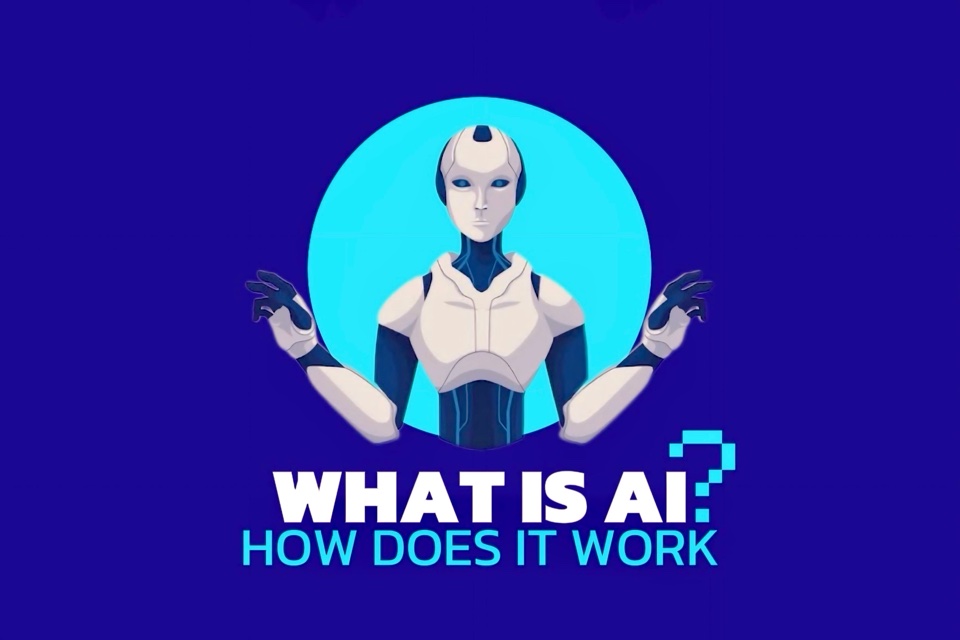It is the year 2025 and AI has become commonplace in our lives. If we talk about a few decades ago, it was just a science fiction. So what happened and what changes took place that brought AI from sci-fi books and movies into the lives of ordinary people.
So let’s try to understand the history, origins, types and future of AI.
What is Artificial Intelligence?
In artificial intelligence, intelligence refers to the ability to make informed decisions or take actions based on the information given by machines. Humans are called intelligent creatures because we can collect information from our surroundings and make independent decisions.
Also read: Artificial Intelligence & Ethics
The human brain has the unique ability to learn, process billions of bits of information every second, solve problems, use logical reasoning, etc.
In artificial intelligence, machines replicate intelligence. Programmers give them information and then program them to exhibit human intelligence.
When a machine takes actions on its own and rationalizes them at the same time, people obviously consider it intelligent.
Understanding the Role of AI
In simple words, According to Google, Artificial intelligence (AI) is a set of technologies that enable computers to perform a variety of advanced functions, including the ability to see, understand and translate spoken and written language, analyze data, make recommendations, and more.
AI can perform all the tasks such as solving complex problems, making decisions, that require human intelligence to solve with a computer system.
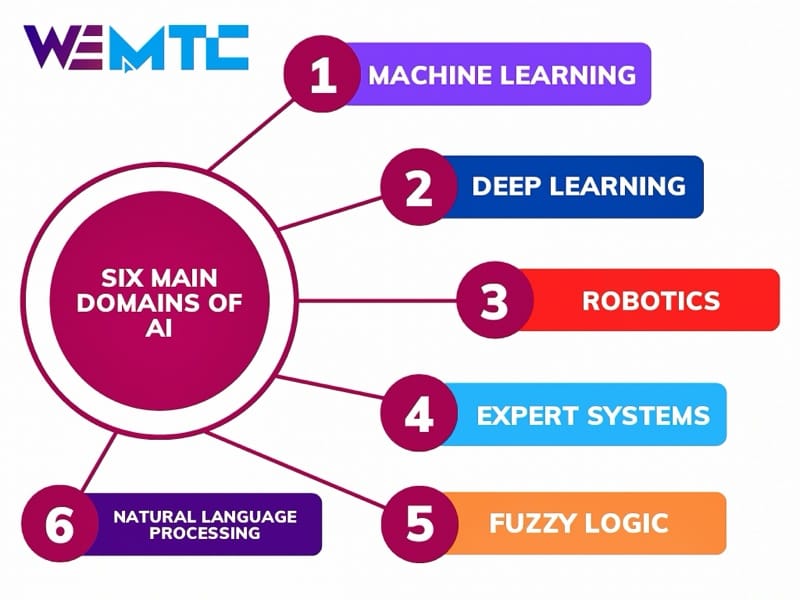
Six Main Domains Of Ai With Examples
- Machine Learning
- Deep Learning
- Robotics
- Expert Systems
- Fuzzy Logic
- Natural Language Processing
1. Machine Learning (Learning from Data)
Machine learning is a type of AI that helps computers learn from data and improve on their own. For example, it suggests videos based on what you watch. Companies use it for speech recognition, language translation, and fraud detection.
2. Deep Learning (Advanced Neural Networks)
Deep learning is a type of AI that helps computers learn from large amounts of data using neural networks. For example, it powers voice assistants and facial recognition. Companies use it for self-driving cars, medical diagnosis, and advanced image processing.
3. Robotics (AI-Powered Automation)
Robotics is a field of AI that helps machines perform tasks like humans. For example, robots assist in factories and hospitals. Companies use them for automation, delivery, and even space exploration.
4. Expert Systems (Decision-Making AI)
Expert systems are a type of AI that help computers make decisions like human experts. For example, they assist doctors in diagnosing diseases. Companies use them for troubleshooting, finance, and customer support.
5. Fuzzy Logic (AI with Approximate Reasoning)
Fuzzy logic is a type of AI that helps computers handle uncertain or imprecise information. For example, it adjusts washing machines based on load size. Companies use it for climate control, medical diagnosis, and automation.
6. Natural Language Processing
Natural Language Processing (NLP) is a type of AI that helps computers understand and process human language. For example, it powers chatbots and voice assistants. Companies use it for translation, sentiment analysis, and customer support.

Short History of Artificial Intelligence
In Roman and Greek mythology, there are numerous mentions of mechanical men, which can be called modern-day robots. For example, one famous name in Greek mythology is Talos. According to the myth, Talos was a large bronze automaton built to protect the Greek city of Europa from attacks by pirates and foreign invaders.
Beyond these myths, our movies and books are filled with machines that think independently. Considering these things, humans have long had the idea of human-like objects with minds of their own.
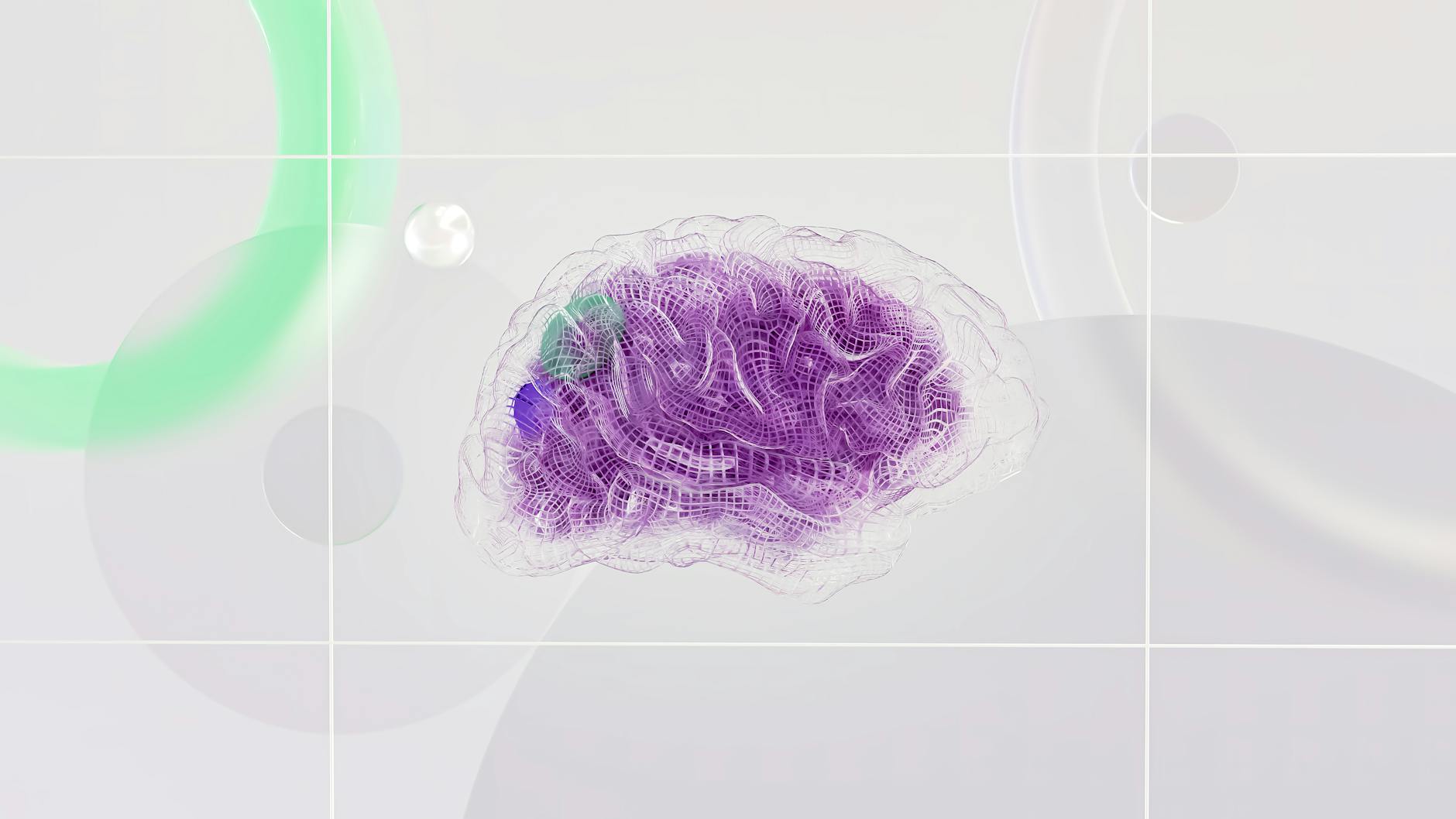
Origin and Development of Artificial Intelligence
For centuries, philosophers have thought of the human mind as a ‘symbolic system’. Whether on a space mission or fighting aliens from other spaces.
AI in Sci-Fi and Pop Culture
Robotic companions to humans have been a staple of sci-fi pop culture. Hollywood films like The Matrix and Man in a Block have portrayed this well.
The Birth of AI as a Field
The real development in the field of artificial intelligence began in 1956 when the field of artificial intelligence was officially established.
Alan Turing’s Vision for AI
Alan Turing, a British mathematician who made his name as the father of theoretical computer science, proposed a proposal that became the basis of AI. The proposal was simple:
Why can’t machines, like the human brain, use information to solve problems and make choices and decisions based on a given set of information?
In a 1950s paper by Turing, he wrote about creating intelligent machines. Machines that could make decisions and perform actions.
However, the ideas in this paper did not immediately catch on. The reason was that, for any machine to be intelligent, it had to be able to store commands. And that was not possible in the 1950s.
John McCarthy and the Term ‘Artificial Intelligence’
A few years later, computer scientist John McCarthy formally coined the term artificial intelligence at a conference at Dartmouth College. People consider him the inventor of AI. At this conference, researchers proposed training ten people for two months.
McCarthy’s proposals included
- Making machines use languages
- Making abstractions and concepts
- Making machines solve the kinds of problems reserved for humans
- And improving themselves
- The scientific community was optimistic about the future of artificial intelligence
In the year 2000, i.e. at the beginning of the 21st century, Honda’s Asimo robot came into the limelight. This robot worked like a human, delivering trays to customers in hotels.
In the same year, a robot named Kismet was invented, which had the ability to understand and imitate human emotions.
The scene changed completely in 2014 when Google’s driverless car passed a test while driving itself. In 2016, the humanoid Sophia robot came out, becoming the first robot to obtain citizenship of a country.
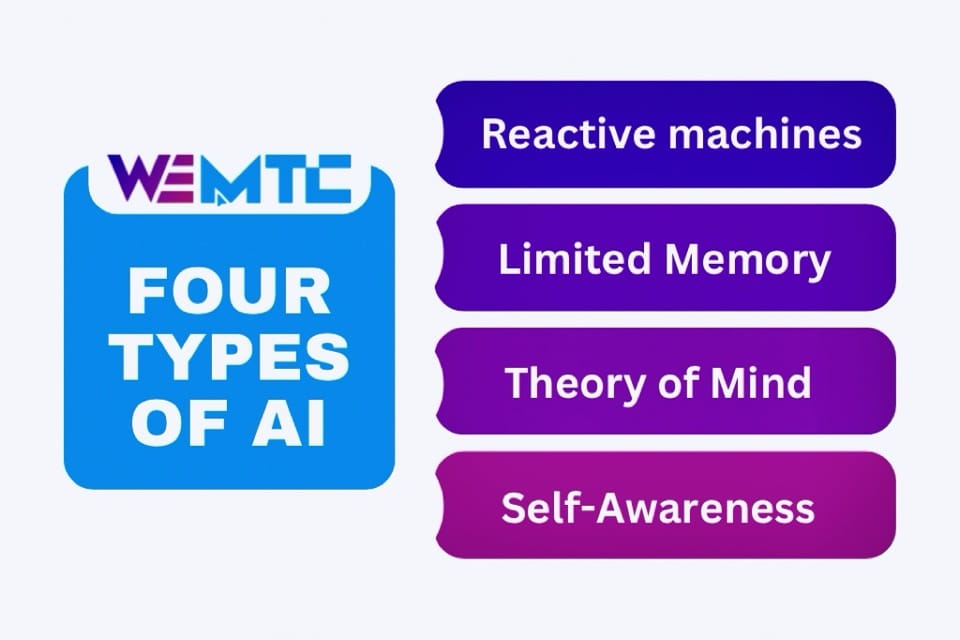
Types of Artificial Intelligence
There are four types of artificial intelligence, which are based on the functionality of artificial intelligence systems, the first of which is
- Reactive machines
- Limited Memory
- Theory of Mind
- Self-Awareness
1. Reactive machines
Reactive machines have limited capabilities. These machines cannot learn from previous tasks they have performed. When working, reactive machines only take into account the data they have at the moment.
2. Limited Memory
Limited memory machines are an upgraded version of reactive machines. These machines can learn from past data.
3. Theory of Mind
This type of AI is still a theoretical concept. The focus of Theory of Mind AI will be on understanding human thoughts, belief systems, needs, thought processes, etc. This will help AI machines to understand human behavior, actions, and emotions in depth.
4. Self-Awareness
This type of artificial intelligence is not far from existence. In this, artificially intelligent humans will have their own consciousness. Like humans, they will also have their own beliefs, ideas, and emotions. This type of AI is also considered a big threat to the human race.
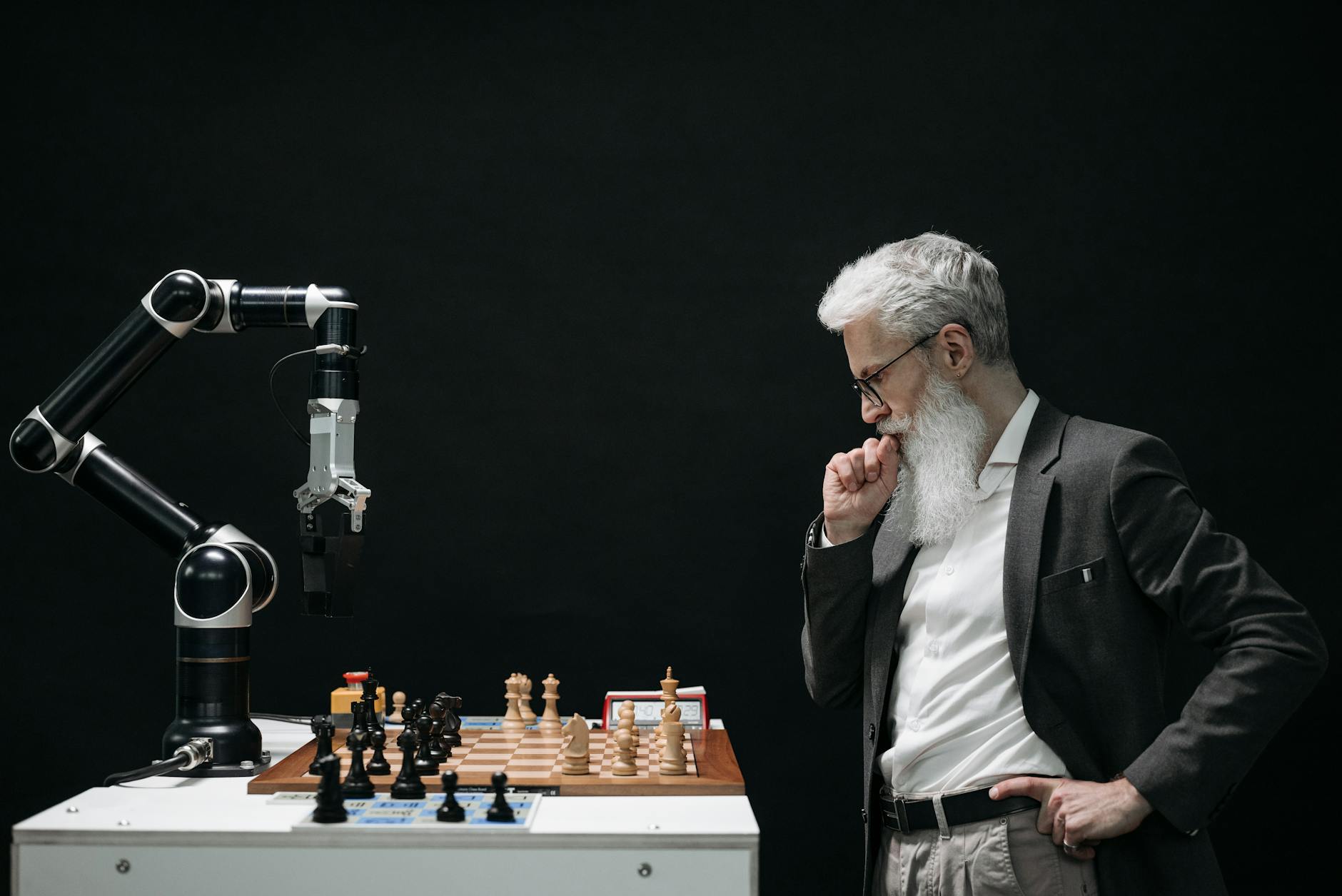
Uses of AI
Artificial intelligence has revolutionized the following fields on a large scale.
- Medicine
- Banking
- Cybersecurity
- Virtual Assistants
💊 Medicine
In the field of medicine, AI has made diagnosis and treatment not only easier but also more accurate. As a result, this helps in saving more lives.
Furthermore, doctors and healthcare professionals widely use AI to monitor patients, select the right treatment, analyze results, collect data, and compile reports to derive effective treatment methods.
🏦 Banking
Now banking is also online, so there is a constant increase in fraudulent payments, money laundering, etc. Artificial intelligence helps banks in risk assessment, preventing money laundering, checking KYC and preventing any payment fraud.
🔐 Cybersecurity
Since digitalization, everyone, from large and small corporations to governments, has their sensitive data stored in digital format. While it has great benefits, it also makes sensitive data vulnerable to cyber attacks and theft.
AI systems can detect even the slightest anomaly and prevent attackers from stealing or destroying sensitive data.
🧑⚕️ Virtual Assistants
These are the most common Ais found in ordinary people’s homes. Virtual assistants like Alexa use voice recognition software.
You can command them to ‘play a song or set an alarm or give information about something’ and they will act on it.
The Future of AI
In 2018, renowned venture capitalist Dr. Kai-Fu Lee made a prediction about AI. He said that AI is going to change the world more than any other invention in human history like electricity. Today, this has really come true.
If we look around us now, all the emerging technologies, from the Internet of Things to machine learning and robotics, are being driven by artificial intelligence. In the future, we can see the following developments in the realm of AI.
The possibilities of AI in the coming era
Have you ever think how AI will change our lives? This technology will open up new avenues for industries and everyday problems. The list below describes the key aspects of the future of AI.
- Industrial development: Increased productivity
- Healthcare revolution: Better diagnosis and treatment
- Education innovation: New ways of learning
- Business growth: Faster and more effective decisions
- Automated transportation: Safer and autonomous vehicles
In addition to Google and Tesla’s self-driving cars, robots will work in common places like restaurants and hotels. Robots are performing tasks like preparing reports, controlling devices and gadgets in our homes and offices.
Tasks that pose a threat to human life, like defusing bombs, will be done by robots. If we think about the impact of AI on our future, there is no limit to our imagination.
In Conclusion: Gaining Expertise in AI is Beneficial
The human future is going to depend largely on artificial intelligence, so getting a certification in this field would be a good idea.
Many institutions have already started courses related to AI, which include online and offline courses. In such a situation, students should also focus on obtaining a certificate of expertise in AI while continuing their school education.
Frequently Asked Questions (FAQ)
Are all these AI tools really free?
Yes, all of these tools have a free version, in which basic features can be used. Some tools also have premium plans, but most of the work is done for free.
Do you need any special skills to use these AI tools?
No, all these tools are designed for ordinary users and their interface is very simple and user-friendly. You can benefit from them even without any technical knowledge.
Do these tools support the Urdu language?
Some tools like ChatGPT and Copy.ai support the Urdu language and can write or translate in Urdu. The rest of the tools work mostly in English, but there is no language restriction for tasks like images or audio/video.
Which tool is best for video editing?
Runway ML and Pika Labs are the best tools for video editing and AI video generation. Both of them provide advanced features and are also easy to use.
Can I use these tools on mobile if I don’t have a computer?
Yes, there are mobile apps or browser versions of Grammarly AI, Canva AI, ChatGPT and some other tools, which can be easily run on a smartphone.
What will these tools do for me if I am a freelancer?
These tools increase your productivity, save time, and deliver professional-quality results. You can get more done in less time, whether it’s writing, design, video, or audio.
How to learn these AI tools?
Most of the tools themselves come with easy videos or instructions. For example, Runway ML and Descript come with full video tutorials, which are very helpful for new users.

